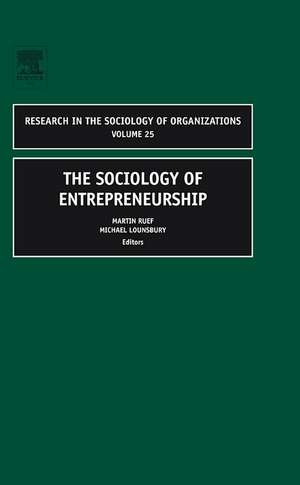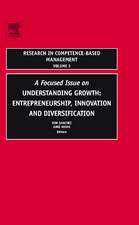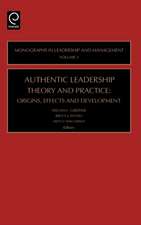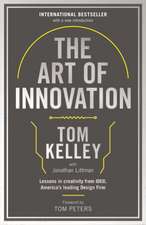The Sociology of Entrepreneurship
Autor Martin Ruef, Michael Lounsburyen Limba Engleză Hardback – 18 mar 2007
The contributors to this volume exemplify how the disciplinary lens of sociology provides a systematic foundation to understand the context, process, and effects of entrepreneurial activity. Topics explored include entry into entrepreneurship, immigrant entrepreneurship and enclaves, academic entrepreneurship, and entrepreneurialism related to new organizational forms. The breadth and depth of the research offered by the esteemed scholars that have contributed to this volume highlight the progressive nature of sociological research on entrepreneurship. Taken as a whole, the volume points the way towards a more comprehensive framework for the development of the sociology of entrepreneurship.
*Research in the Sociology of Organizations is an international series
*It is especially concerned with specifying the unique contributions of sociological theories and research techniques to the analysis of organizations
*Each volume aims to foster debate and dialogue about the value of new theories and research to the field of organizational sociology as well as the growing international community of organizational scholars
Preț: 1030.91 lei
Preț vechi: 1338.84 lei
-23% Nou
Puncte Express: 1546
Preț estimativ în valută:
197.29€ • 205.21$ • 162.87£
197.29€ • 205.21$ • 162.87£
Carte tipărită la comandă
Livrare economică 14-28 aprilie
Preluare comenzi: 021 569.72.76
Specificații
ISBN-13: 9780762314331
ISBN-10: 0762314338
Pagini: 380
Ilustrații: Illustrated
Dimensiuni: 176 x 239 x 26 mm
Greutate: 0.7 kg
Editura: Emerald Publishing
ISBN-10: 0762314338
Pagini: 380
Ilustrații: Illustrated
Dimensiuni: 176 x 239 x 26 mm
Greutate: 0.7 kg
Editura: Emerald Publishing
Public țintă
Scholars, students, and practitioners of sociology, entrepeneurship, management, sociology of organizations, and public policy.Cuprins
Introduction to Volume
1. The Sociology of Entrepreneurship
Martin Ruef (Princeton University) and Michael Lounsbury (University of Alberta)
I. Entry into Entrepreneurial Activity
2. A Life Course Perspective on Occupational Inheritance: Self-employed Parents and Their Children
Howard E. Aldrich (UNC-Chapel Hill) and Phillip H. Kim (University of Wisconsin)
3. Closure and Exposure: Mechanisms in the Intergenerational Transmission of Self-employment
Jesper B. Sørensen (Stanford Graduate School of Business)
4. Boundary Formation in Emergent Organizations
Hongwei Xu (National University of Singapore) and Martin Ruef (Princeton University)
II. Immigrant Entrepreneurship and Enclaves
5. Revisiting the Enclave Hypothesis: Miami Twenty-Five Years Later
Alejandro Portes (Princeton University) and Steven Shafer (Princeton University)
6. The Force of Regulation in the Land of the Free:
The Persistence of Chinatown, Washington D.C.as a Symbolic Ethnic Enclave
Ching Lin Pang (Catholic University of Leuven) and Jan Rath (University of Amsterdam)
III. Academic Entrepreneurship
7. From Vulnerable to Venerated: The Institutionalization of Academic Entrepreneurship in the Life Sciences
Jeannette A. Colyvas (Stanford University) and Walter W. Powell (Stanford University)
8. Start-ups in Science: Entrepreneurs, Diverse Backing, and Novelty Outside Business
James A. Evans (University of Chicago)
IV. Entrepreneurship and Organizational Forms
9. Turning Identity into Form:
The Cause and Consequence for Kaiser Permanente of Becoming an HMO
Carol A. Caronna (Towson University)
10. Entrepreneurship at the Margins of Society: Founding Dynamics in Gray (Sex Shops) and Black Markets (Mafia)
Luca Solari (Università Degli Studi di Milano)
1. The Sociology of Entrepreneurship
Martin Ruef (Princeton University) and Michael Lounsbury (University of Alberta)
I. Entry into Entrepreneurial Activity
2. A Life Course Perspective on Occupational Inheritance: Self-employed Parents and Their Children
Howard E. Aldrich (UNC-Chapel Hill) and Phillip H. Kim (University of Wisconsin)
3. Closure and Exposure: Mechanisms in the Intergenerational Transmission of Self-employment
Jesper B. Sørensen (Stanford Graduate School of Business)
4. Boundary Formation in Emergent Organizations
Hongwei Xu (National University of Singapore) and Martin Ruef (Princeton University)
II. Immigrant Entrepreneurship and Enclaves
5. Revisiting the Enclave Hypothesis: Miami Twenty-Five Years Later
Alejandro Portes (Princeton University) and Steven Shafer (Princeton University)
6. The Force of Regulation in the Land of the Free:
The Persistence of Chinatown, Washington D.C.as a Symbolic Ethnic Enclave
Ching Lin Pang (Catholic University of Leuven) and Jan Rath (University of Amsterdam)
III. Academic Entrepreneurship
7. From Vulnerable to Venerated: The Institutionalization of Academic Entrepreneurship in the Life Sciences
Jeannette A. Colyvas (Stanford University) and Walter W. Powell (Stanford University)
8. Start-ups in Science: Entrepreneurs, Diverse Backing, and Novelty Outside Business
James A. Evans (University of Chicago)
IV. Entrepreneurship and Organizational Forms
9. Turning Identity into Form:
The Cause and Consequence for Kaiser Permanente of Becoming an HMO
Carol A. Caronna (Towson University)
10. Entrepreneurship at the Margins of Society: Founding Dynamics in Gray (Sex Shops) and Black Markets (Mafia)
Luca Solari (Università Degli Studi di Milano)




















